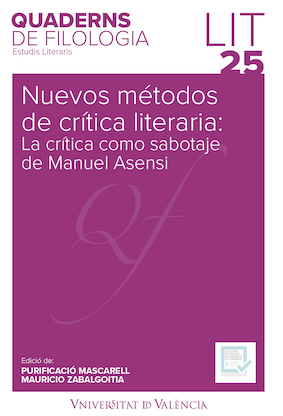On the Great Literary Strike. Jacques Derrida and the Deviations of Performativity
DOI:
https://doi.org/10.7203/qdfed.25.19003Keywords:
Derrida, performativity, literature, strike, sabotage. Abstract
Abstract
The aim of this study is to analyze the performativity of literature in Derrida’s thought, as well as its political possibilities to interrupt the constitution of symbolic orders (identities, races, genders). The capability of literature to “sabotage” the naturalized production of an order through the operativity of the discourse resides in the particularity of its performative force, which Derrida names in Force de loi as “force de rupture”, or the right to strike in every interpretation. In this sense, the performativity of literature is not about constituting, but destituting; it is not about producing or positing the world, but deposing it. This study about the oblique force of literature will show its political character, as well as its tight link with democracy: the opening or the hospitality that both literature and democracy demand is a permanent possibility of sabotage and dis-interpellation.
 Downloads
Downloads
Downloads
Published
How to Cite
-
Abstract515
-
PDF (Español)582
Issue
Section
License
 Este obra está bajo una licencia de Creative Commons Reconocimiento-NoComercial-SinObraDerivada 4.0 Internacional.
Este obra está bajo una licencia de Creative Commons Reconocimiento-NoComercial-SinObraDerivada 4.0 Internacional.
Authors who publish with this journal agree to the following terms:
- Authors retain copyright and grant the journal right of first publication with the work simultaneously licensed under a Creative Commons Attribution License that allows others to share the work with an acknowledgement of the work's authorship and initial publication in this journal.
- Authors are able to enter into separate, additional contractual arrangements for the non-exclusive distribution of the journal's published version of the work (e.g., post it to an institutional repository or publish it in a book), with an acknowledgement of its initial publication in this journal.
- Authors are permitted and encouraged to post their work online (e.g., in institutional repositories or on their website) prior to and during the submission process, as it can lead to productive exchanges, as well as earlier and greater citation of published work (See The Effect of Open Access).




